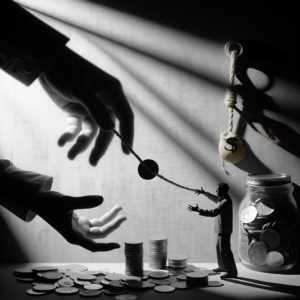In the realm of relationships, financial abuse often hides behind closed doors, leaving scars that may not be visible to the naked eye. It is important to be aware of the common signs that may indicate this type of abuse, as recognizing them is the first step towards seeking support and finding a way out. From controlling every penny spent to denying access to financial resources, these red flags can help shed light on a disturbing reality that affects countless individuals. So, let’s uncover the veil and shed light on the signs of financial abuse in relationships.
Isolation
Financial abuse in relationships often begins with isolation. Your partner may restrict your access to friends, family, and other support systems. They may create a sense of dependency on them, making it difficult for you to seek help or escape from the abuse. By isolating you, they gain control over your financial decisions and make it easier to manipulate and exploit you.

Limited access to money
One of the telltale signs of financial abuse is limited access to money. Your partner may control the household finances by giving you a small allowance or denying you access to your own earnings. They may hide bank statements, passwords, and other financial information, ensuring that you remain financially dependent on them. This lack of financial autonomy can lead to feelings of helplessness and anxiety about your future.
Unjustified control over finances
Financial abusers often exert unjustified control over the household finances. They may make all financial decisions without consulting you, regardless of your contributions or opinions. They might take complete control of budgeting, spending, and saving, leaving you with no say in how money is managed. This control can feel suffocating and diminish your sense of self-worth.
Financial abusers may pressure you into sharing sensitive financial information, such as your bank account details, credit card information, or passwords. They may justify this as an act of trust and love, but in reality, it’s a means of gaining further control over your finances. By having access to this information, they can monitor your financial activities and exploit them to their advantage.
Being threatened with financial consequences
One of the most coercive forms of financial abuse is when your partner threatens you with severe financial consequences. They may manipulate and intimidate you by threatening to leave you destitute, cut off financial support, or ruin your credit score. This manipulation instills fear and forces you to comply with their demands, even if it goes against your own welfare.
Forced to provide financial support
Financial abusers may force you to provide financial support for them, their family, or their friends, even when it is unreasonable or burdensome. They might guilt-trip you or use emotional manipulation to make you feel obligated to shoulder their financial responsibilities. This exploitation can leave you financially drained and unable to meet your own needs and aspirations.
Another clear sign of financial abuse is the unauthorized use of your funds. Your partner may use your money or credit without your knowledge or consent. They may open joint accounts without consulting you, accumulate debt in your name, or use your personal funds for their personal indulgences. This misuse of your finances is a violation of your trust and an abuse of power.
Sabotaging your ability to work
Financial abusers often sabotage your ability to work or pursue a career independently. They may prevent you from getting a job, interfere with your professional relationships, or undermine your confidence and competence. By limiting your financial independence, they maintain control over you and your access to resources.
Preventing access to financial records
A common tactic of financial abusers is to restrict your access to financial records and information. They might withhold bank statements, insurance policies, or tax documents, making it difficult for you to understand and monitor your financial situation. This secrecy allows them to manipulate the narrative and keep you in a state of uncertainty and vulnerability.
Economic exploitation
Financial abuse is a form of economic exploitation where your partner uses their financial power to exploit and control you. They may use money as a weapon to demean, belittle, and dominate you. This type of abuse can cause immense psychological and emotional harm, leading to low self-esteem, anxiety, and depression.
In conclusion, financial abuse in relationships is a serious issue that can have long-lasting effects on your well-being and financial independence. Recognizing the signs of financial abuse, such as isolation, limited access to money, unjustified control over finances, and economic exploitation, is crucial for breaking free from this form of abuse. If you find yourself in a financially abusive relationship, reach out to local support organizations and take steps towards reclaiming your autonomy and financial security. Remember, you deserve to be treated with respect and have control over your own finances.